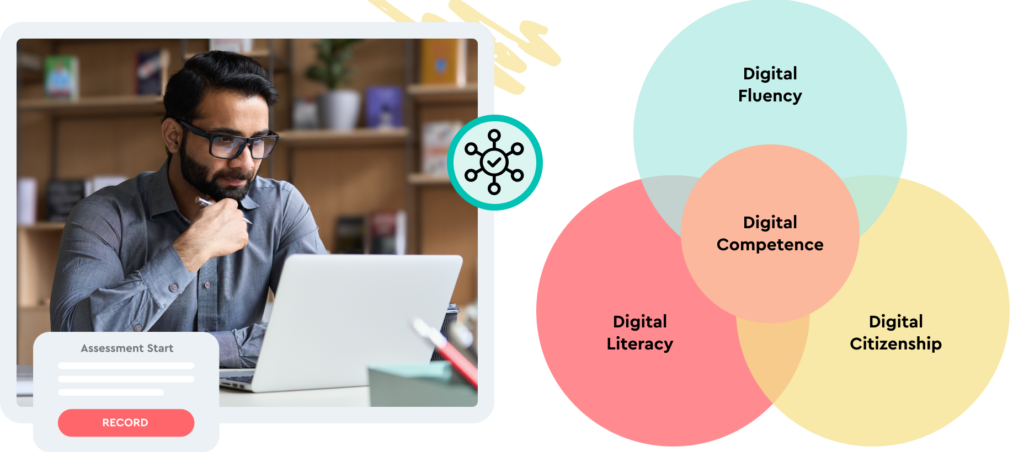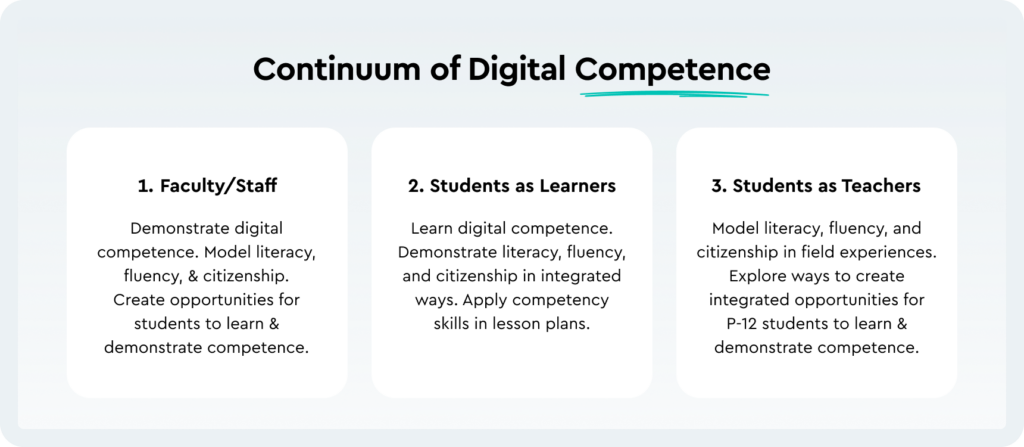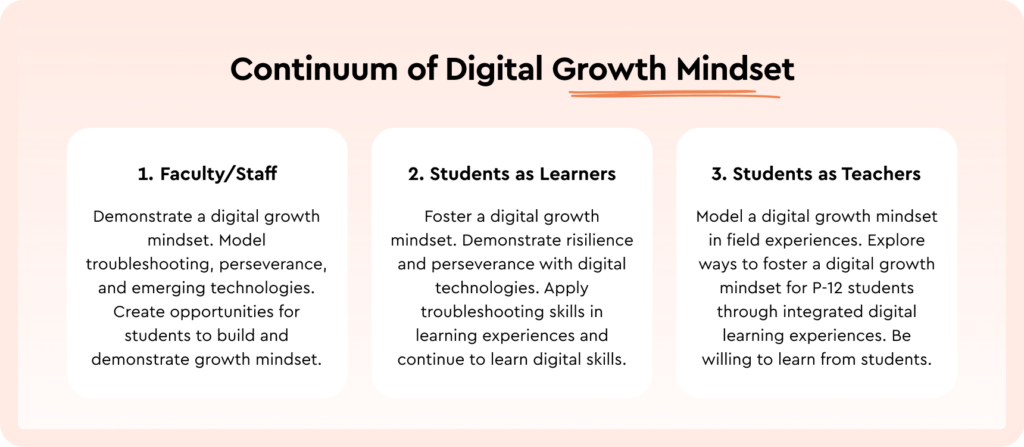One of the sessions from the 2022 ReAction Virtual Conference focused on the relationship between digital competence and digital growth mindset. The speaker, Jana Gerard— Coordinator for the College of Education, Health and Human Studies and EDvolution at Southeast Missouri State University (SEMO)—is passionate about leveraging technology for learning and teaching. Jana recently accepted the 2022 AACTE Best Practice Award for Innovative Use of Technology on behalf of her department for the implementation of the EDvolution Model. The model cooperatively enhances pre-service educators’ technological skills while serving the technology demands of area schools and districts.
In this session, Jana discussed what it means for pre-service educators to be digitally competent and how we can help pre-service educators become digitally competent. This session also covered digital growth mindset: What is a digital growth mindset, and how do we help pre-service educators develop one?
It’s hard to choose some favorite moments and highlights from the webinar, but here are five moments that stand out the most.
1. Defining digital competence as it relates to digital literacy, digital fluency, and digital citizenship
Jana Gerard: “We have to think of digital competence as a combination of things. It is the knowledge, skills, and attitudes about using technology. And it’s about how we’re using technology, we’re performing tasks, we’re solving problems, we’re communicating, we’re analyzing our data and managing our data, we’re collaborating. But then it’s also about creating and sharing and doing that effectively, appropriately, securely, critically, creatively, independently, and ethically. Digital competence is a combination of digital literacy, digital fluency, and digital citizenship.”

2. Why digital competence for pre-service educators
Jana Gerard: “The 2022 CAEP Standards, part of standard R1.3, is providers make sure that candidates can model and apply national or state approved technology standards. If you’re not a CAEP program and you use AAQEP, AAQEP doesn’t specifically talk about technology, but they do talk about understanding how to assess student learning and data literacy. So data literacy, again, fits into that digital fluency and digital literacy, and then using the data also fits into those digital literacy skills.
And then there’s the 2017 ISTE Standards for Educators. I can’t speak for every state. Some states have technology standards, and some states don’t. We are here in Missouri, and our state does not have Missouri learning standards for technology. So we use the 2017 ISTE Standards for Educators for our faculty and our pre-service educators, but then we also teach our students, our pre-service educators, about the 2016 ISTE Standards for Students. So we hold our students, our higher ed students, to the 2017 ISTE standards for educators, but we expect them to consider the 2016 standards for students as they’re creating those learning experiences.”

3. Defining digital growth mindset
Jana Gerard: “For the definition of digital growth mindset, we’ve taken that idea of growth mindset from Carol Dweck and then applied it very specifically to the digital world. The definition of a growth mindset is that people believe that they can develop skills that can develop love of learning, they can develop resilience, and that to be successful, that growth mindset is truly necessary. So the digital growth mindset takes this idea of growth mindset and applies it specifically in the digital world. We take that idea of growing and understanding and say that, not only can you do that throughout your learning experiences, you can definitely do it in the digital space. What we’ve discovered, and this is part of my research that I did in my dissertation, is that this digital growth mindset is really the biggest piece that we need students to take away from EL300, and it’s critical to be able to help them grow from those digital fluency skills into those digital literacy skills.”
4. Why digital growth mindset for educators is important
Jana Gerard: “Growing from the digital fluency to the digital literacy truly allows our pre-service educators to really have those opportunities to influence the communication, collaboration, critical thinking, and creativity, those four C’s of Future Ready Learning, into their learning experiences that they are creating for their P–12 students, as well as having them understand that they are going to need to have continual skill development throughout their teaching career. They’ve got to continue developing those technology skills either through formal professional development or just through their own interests and informal professional development.”
5. How to foster a growth mindset
Jana Gerard: “So how do we foster this digital growth mindset? There’s the modeling continual learning with digital tools: engaging in the professional development, having that willingness to learn emerging technologies, as well as understanding that we need to reach out to our stakeholders. There’s this continuum of the digital growth mindset. The faculty and staff demonstrate the digital growth mindset. We model the troubleshooting, the perseverance, and we model the use of emerging technologies. And then the faculty really create opportunities in the curriculum for students to build and demonstrate that growth mindset.
Then the students as learners are fostering their own digital growth mindset, demonstrating that resilience, perseverance, and troubleshooting for themselves, which they then take into students as teachers where they are modeling that digital growth mindset in their field experiences and then discovering ways to help foster that digital growth mindset for their P–12 students. And again, the leadership culture and environment play a big role in fostering this idea of digital growth mindset.”

To see these highlights for yourself and to dive even deeper into digital competence and digital growth mindset, watch the full session.









